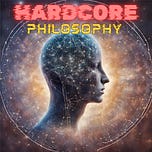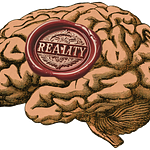“CONSCIOUSNESS EMERGES FROM THE BRAIN.” Nowadays this seems like common sense, even if we don’t quite know what it means. The brain is in some sense responsible for who we are, right?
But in what sense? That is very hard to figure out.
A little while back I came across an article published in Psyche in which the author talks about what he learned about the mind and self from his experience as a neurosurgeon. It’s just the latest example of a popular science article that left me thinking I was presented with a conclusion that didn’t match the evidence provided. It makes me wonder if consciousness studies reveal more about our philosophical commitments than what’s being investigated. Let’s see what you think.
WHERE IS MY SELF?
THE AUTHOR BEGINS with the oft-cited case of a patient whose brain hemispheres are cut off from one another. The patient experiences himself as one undivided self, and yet, the author of the article thinks this demonstrates that the self is an illusion. I’ve talked about illusions before.:
“In a sense, the surgery had created two separate selves. In some of these patients, one side of their body (controlled by one hemisphere) would do one thing, while the other half (controlled by the other hemisphere) would do the opposite. For example, one hand would button their shirt while the other hand would unbutton it.
“So why didn’t these split-brain patients, post-surgery, feel like they had two selves? The answer is that their brains fooled them into thinking that only one self existed and that it was in charge. When one of their hands did something unexpected, they made up a story to explain why. I changed my mind. I didn’t like the way that shirt looked. These stories or confabulations show the power of the illusion of selfhood…”
So if I trip over my own foot and make up a dumb excuse for doing so, am I really two selves? Or do I also have to have my brain split in two? Whatever the case, when he asks why the patients didn’t feel like they had two selves, he ignores the simple answer—because they aren’t two selves—preferring instead to let his own perplexing assumptions override the experience of a unified self.
He goes on to list various regions of the brain he has removed over the years, including the parietal lobe, and explains that after these surgeries, “the patient emerges feeling whole, as if none of them was missing.” Later in the article, however, he locates our sense of self primarily in the parietal lobe:
“There are places in the brain where this multisensory integration occurs, mostly in the parietal lobe. If a neurosurgeon stimulates these areas with an electrode in an awake patient in the operating room, we can cause the sense of self to dissolve.”
The parietal lobe, then, should be necessary to our sense of self or not. If it is, then removing this part of the brain should cause that person to feel some loss of self, right? Isn’t that the way this is supposed to go? But according to him, removing this part of the brain doesn’t cause a loss of sense of self. Why should the sense of self—illusory or not—only correlate to the brain in one case when we would expect it to correlate in both cases? Yet he comes to the nonsensical conclusion that your mind, your free will, and your sense of self are illusions:
“I’ve thought about the implications of this for decades and I’ve come to realise that the only way forward is to accept the unnerving counterintuitive conclusion that the mind and the self do not physically exist. Which is not to say that they don’t exist at all. They are fictional mental constructs, akin to the concepts of love, justice or freedom.”
In other words, if your mind turns out not to be physical, then it must be a fiction.1 But, he insists, fiction exists! Fiction is real!
Of course fiction exists. And so does this Valentine’s Day card, for that special mental construct in your life:
Those of us who don’t have his theoretical commitments are more apt to see the evidence as pointing in exactly the opposite direction: The mind-self is not the brain.2 As one commenter put it:
“With regards to corpus callosotomy patients and the like, all that demonstrates to me is that the ‘self’ and ‘locus of volition’ aren’t bound within the cranium.”
Exactly. But maybe this only seems obvious to those of us who aren’t concerned about saving the paradigm? Whatever the case, I think it takes some serious balls to prop up findings such as these in support of a nonsensical interpretation that, by physicalist decree, must be true.
When you take lived experience rather than physicalism as your starting point for understanding consciousness (I talked about this in my last post), it becomes clear that the mind-self can’t be the brain. The brain is a thing experienced, a thing amongst other things, like tables and bacteria. I think most of us get this intuitively. When we try to equate an object of experience with experience itself, it’s like an error message springs up in the back of our minds. Perhaps this explains why even strict reductive materialists can’t seem to avoid talking about consciousness emerging from the brain. Imagine if you heard someone talking about unmarried men emerging from bachelors. That would be pretty weird.
EXPERIENCE IS LIKE A WINDOW
(But there’s no danger of flying into it!)
WE EXPERIENCE EVERYTHING. There is nothing we don’t experience. If you think of something you don’t experience, you’ll soon realize you really do experience it, otherwise you wouldn’t be able to think of it.
(Bear with me now.)
Experience is often associated with qualia and sensory perception, but I take experience to be much bigger than that. Strictly speaking, we don’t experience raw sensory data except as a theory. That’s not to say I don’t want to include theories. We experience theories too!
Experience, taken in the broadest sense, is the basis on which we can know anything at all about the world or the self or even the brain. Experience is like a very clean window in that most of the time we don’t see it—which makes it all too easy for us to suppose it’s not here. But it’s always here and has been all along.
But there’s no seeing it. It is not a thing. We can’t look at experience ‘as it is in itself’. It’s almost as if we can only look ‘through’ it, but experience is not an it to look through.
Experience may be layers and layers with no rock bottom. There is no reason to think we can know experience indubitably or infallibly or even with any great certainty, but there’s only one way to know we’re wrong—more experience!
Not even science has the power to transcend experience. Science is conducted by scientists—science is ‘nothing over and above’ the work done by scientists—and scientists have experiences that don’t shut off while they’re coming up with theories about the supposedly illusory nature of consciousness.3 All science takes place within the experiences of scientists. If it really is the case that all experience is illusory, so too are all scientific findings, as well as knowledge of anything whatsoever. It makes no sense to leverage a perspective we have no access to, an out-of-experience view from nowhere, in order to throw all experience out the door. Not even science can rip the rug out from under its own feet.
Experience can’t be entirely illusory, as some would have us believe. It can’t even be mostly illusory. Just as lies are only possible in a larger environment of truth-telling (if everyone lied all the time, language would break down), errors and illusions can only be brought to light against a larger background of genuine reality.
Veridicality makes illusions possible.
WHAT DO YOU THINK?
Can the mind-brain identity theory be saved? Do consciousness studies support your views? Can experience be massively wrong?
Do you believe YOU are an illusion?
NEW UNRELEASED TRACK
The music in this podcast episode is by Nick Herman. Discover his music on Bandcamp. Support indie artists!
You can customize which bits of this newsletter you receive by visiting your account. To get full access to my published books and posts, upgrade your subscription. Find out more.
Thanks for supporting my niche literary endeavors and off-beat philosophical speculations. Cheers!
The point of illusionism is to account for experience within a physicalist framework—if it’s not physical, it’s an illusion. Illusionism rides on the promise of a fully physical explanation of consciousness (whatever physical means). To admit that (the illusion of) consciousness isn’t physical and to offer that in support of illusionism is like buttoning your shirt while simultaneously unbuttoning your shirt while saying, “I meant to do that.”
I think we could get mixed up when we equate the self and mind, but for the sake of this discussion I thought it simpler to follow the example of the author of the article.
The mind-as-computer metaphor is popular nowadays, so I’ll run with it (take this figuratively or literally, however you please). Illusionists and eliminative materialists imply only they have access to the inner workings of the machine; the rest of us have only the illusory icons of “folk psychology” to work with. First of all, icons manipulate the inner workings, presumably, so this analogy doesn’t work if you think illusory phenomenal experiences can’t affect brain states. But putting that aside, what gives them access to the inner workings of the machine, beyond the illusory icons? If they wish to humbly admit no one gets beyond the icons, then they have no access to the reality on which the illusory nature of experience must be based in order to be called illusory.















Share this post